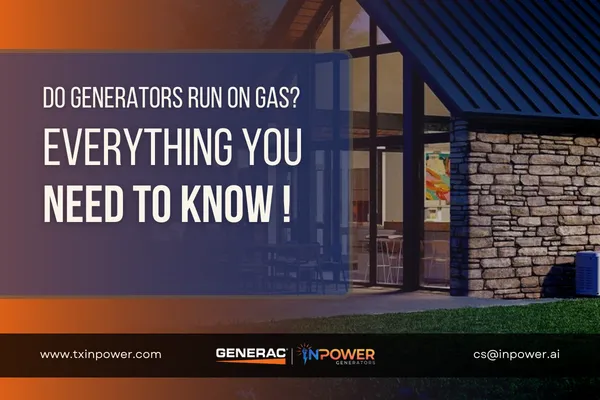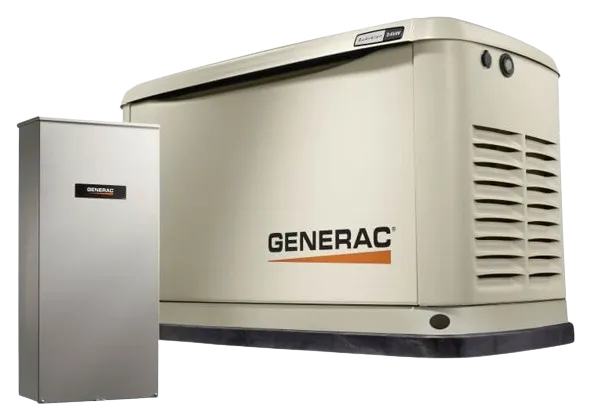OUR BLOG

Do Generators Run on Gas? Everything You Need to Know
To answer your question, “Do generators run on gas?” one must comprehend that gas generators exist and are eco-friendly. An alternative to more common fuels like diesel or gasoline is a gas generator, a subset of the genset. To "fuel" a gas generator, you can use natural gas or biogas, which is better for the environment than diesel or gasoline. A gas generator's sole real distinction from a diesel generator is the fuel it runs on. Other than that, gas generators serve the same functions.
Due to the price difference between gas and diesel, gas generators are more cost-effective and can supply more power to various buildings and properties, including hospitals, office buildings, leisure centers, shopping centers, agricultural facilities, and residential properties.
One alternative to diesel generators is gas generators, which can serve as primary or backup power sources for a property. So, it is time to stop asking Do generators run on gas?” this is because gas lines can be laid underground, making them less susceptible to interference from the outside world. Fueling the generator with gas has the advantage of not degrading like diesel.
Parts Of A Natural Gas Generator
Each of the numerous moving components of a natural gas generator contributes to the final output of the electricity that powers your company's vital machinery and processes without questioning Do generators run on gas?”. These are the primary parts:
Fuel: First and foremost, Natural gas power generators require fuel to begin operating. Your local government likely already has a natural gas pipeline that you can use to get fuel.
Combustion chamber: The combustion engines that produce natural gas utilize a chamber for fuel and air compression and subsequent combustion.
Pistons: Parts of the engine called pistons move up and down in the combustion chamber to change the volume of air and fuel compressed to make it more explosive.
Spark plugs: A spark plug is a little component that sticks out into the combustion chamber and has electrodes on either end.
Crankshaft: An integral part of the engine, the crankshaft transfers the pistons' axial and transverse motions into a rotational motion. This action generates electrical current by spinning the rotor within the stator.
Stator: An insulated coil of wire forms the stator, a stationary cylinder encircling the rotor.
Rotor: To generate a strong electrical current, the stator contains an electromagnetic shaft that rotates; this component is known as the rotor.
What Is The Going Rate For Using Natural Gas In A Generator?
An excellent ally in times of blackout is a natural gas generator. Since we are not connected to the power grid, we must use natural gas to power our appliances. We researched the price of running a generator on natural gas. Three main factors determine a generator's running cost:
Generator size: It stands to reason that a 5,000W generator will use less natural gas than a 20,000W generator. You can use the running cost calculator for natural gas to determine how much it costs to run a generator per hour.
Price of natural gas in your area: There is a correlation between the price of natural gas and the cost of fuel consumption per kWh for natural gas generators. To illustrate, Consider two identical generators; one uses $20/m3 of natural gas, while the other uses $10/m3. Compared to a $10 natural gas cost generator, a $20 generator will have twice the operating cost per kWh.
Running load: The operating voltage of a generator can range from zero to one hundred percent of its maximum output wattage. Your generator's operating expenses will rise if you operate it at 60% load instead of 40% load.
With these details, we can determine your natural gas generator's hourly, daily, weekly, and monthly costs. For a 1,000W generator operating at 25% load and a 30,000W generator operating at 100% load, the hourly cost of running the generator on natural gas ranges from $0.02 to $2.41. It will use natural gas in the range of 1.86 ft3 to 222.90 ft3 per hour.
Benefits Of Natural Gas Generator
1. Dependability
A few decades back, there were no electric generators as gas generators were only used, and no one asked Do generators run on gas?”. With daily output reaching 101.3 BCF in 2018, the US achieved a new record for natural gas production. Despite earning a new record high the previous year, production grew at the fastest rate year over year. There is a system of over 300,000 miles of pipelines that carry this gas, with over 200 of them.
But what exactly does all that capability imply? Reliability. There is an abundance of the fuel needed to generate electricity in the event of an emergency, so owners of natural gas generators can relax. The requirement to store it is eliminated as it can be transported via utility lines.
Numerous authorities have expressed concern about Do generators run on gas?” and the fragility of the United States' power grid, citing its advanced age as a major risk. A shortage of gasoline, diesel, or propane may occur now. As a precaution against these kinds of disasters, it is wise to generate electricity on-site using natural gas, the most accessible fuel for this purpose.
2. Cost-Effectiveness
The relative cost of fueling a diesel generator vs a natural gas generator can be demonstrated by a few computations:
At the current national average price of approximately $3 per gallon, diesel contains 137,381 Btus, as the U.S. Energy Information Administration reported. That works out to nearly $22 for 7.5 gallons, which is required to get 1 million Btus.
Currently, the cost of 1 cubic foot of natural gas—as delivered to residential consumers—is $0.01286, and the gas has 1,036 Btus. An additional 965 cubic feet would be required to achieve 1 million Btus, bringing the total cost to $12.41—barely half of the diesel price.
There is a trade-off between the initial investment required to acquire and install a natural gas generator and the lower maintenance costs compared to diesel gensets, particularly in cases where new gas lines are needed. Nonetheless, these expenses are more manageable in the long run after getting the question Do generators run on gas?” answered and on par with diesel, thanks to the cheap cost of natural gas.
3. Eco-Friendly
As far as fossil fuels go, natural gas burns the cleanest, answering the question Do generators run on gas?”. As compared to diesel generators, it produces half the amount of sulfur dioxide (SO2), nitrogen oxides (NOx), mercury (Hg), and particulate matter (PM) as coal, and up to 90% fewer emissions.
Naturally, gas generators can use field gas to reduce their harmful emissions. The flaring process typically eliminates hundreds of billions of cubic feet of gas annually from wellhead gas produced during drilling operations. This raw gas can be used by specially equipped natural gas generators to power buildings and equipment on drilling sites, eliminating the need for diesel generators.
4. Ease Of Use
With this advantage, one will skip asking, “Do generators run on gas?”. Due to their lower emissions, there is less of a need to regulate natural gas generators by the EPA and other regulatory bodies. It should be easier to obtain a permit to operate one now. They can also be utilized for cost-saving operations like peak shaving as non-emergency generators. Many diesel generators aren't environmentally compliant, so diesel generators won't be able to accomplish this. Non-emergency generator emissions standards are also tighter.
Natural gas generators are more silent when running than diesel or gasoline. No offensive odor is released by them either, unlike those generator types. In cases where regular fuel delivery is problematic, such as on a rooftop, or when the building owner is confronted with limited or restricted space, natural gas generators are frequently the sole viable option. Less space is required, and there is no risk of fuel spills or expensive cleanup because there is no need for storage tanks.
So, we hope we have answered the question “Do generators run on gas?” with utter depth. Other than that, if you ever need to hire generator installers and repairers, feel free to contact us at In Power Generators.
Here, we take pride in our work and erasing your worries regarding your generators hassle-free.
Let In Power Generators install and maintain. Get a free quote now!

As Seen On Facebook, TikTok & Google
$1,500 INSTANT REBATE
WHEN YOU PURCHASE A WHOLE-HOUSE GENERATOR
What Our Customers Say About Us
Latest Reviews






5 Star Reviews




Serving Houston, Austin, San Antonio, DFW, Corpus Christi and Waco Markets





